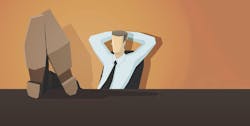Housing Market: The Times They Are a Changin’
Anyone actively involved in the housing industry since 1980 knows the cyclical nature of the market.
Among many signs I’ve seen recently, an online article posted by this magazine, “Market Conditions Pummeling Buyers, Builder Stocks,” indicated to me that we are nearing the end of one of the longest-ever housing expansions. Which means it’s time to sharpen your sales practices.
A timely observation for home builders is a sports analogy from leadership coach Mike Moore, who cautions that leading a game can fool you into thinking you’re better than you are. “Sometimes the score will be in your favor even though you haven’t given your best effort,” he says. “Often the quality of your competition will lull you into playing below your ability.”
Strong markets can breed (and, in fact, reward) weak players. When there are more homebuyers than homes, combined with extremely low interest rates, lesser-skilled order-takers and sales managers can appear to prosper. But when demand falls and competition for buyers gets fierce, undisciplined sales teams and their builders will be the first to suffer.
How Ready Are You for Fluctuations in the Housing Market?
Here’s a quick, easy test of your current level of effort and readiness for a downcycle. Regardless of how many homes you’re currently selling, consider what you would do if interest rates suddenly jumped to 7 percent and your traffic count dropped by half or more. What would be your first move?
To be a serious contender in that environment, you’d need to shift your mindset, implement disciplined systems, and create a culture of sales excellence. What should your first step be? From my experience through three housing recessions, here’s a short checklist to get started.
1] Constantly raise the bar
Ask yourself, “With our present approach to the market, how many sales and how much revenue and profit are we missing, and what can we do to fix it?”
2] Don’t get comfortable
Recently I heard a sales trainer tell a group of managers that “it’s important for your salespeople to be happy.” But that’s not a good mindset. Why? Because when people are happy, they’re in their comfort zone, and comfort stifles the passion for excellence.
Selling is a developed skill and a performance art. When performers are coached to focus on constant learning and improvement, the results begin to take care of themselves.
3] Understand the business you’re in
This isn’t real estate, it’s retail. And, just as with retail, builders need to be open for the convenience of the customer, not the convenience of the company. That means keeping sales center hours that are most convenient for buyers (not you) and adequately staffing those centers to catch every opportunity.
4] Perfect your presentations
I’ve heard and read that today’s salespeople should be spontaneous; a scripted approach is out!
I couldn’t disagree more, so let me kill that notion right now by exposing the differences between an average (but by all appearances “successful”) new-home salesperson in a good market and a consistently high-performing salesperson in any market condition:
The average salesperson (the one who rejects scripts) sees customer interactions as “social” events during which they may do business. When someone walks into the model and says, “I don’t want to buy anything, I’m just looking around,” this salesperson usually backs off, leaving the customer in control.
The consistently high performer, however, implements a planned, focused, organized, interactive, and highly engaging conversation, which he or she initiates and manages from the outset. The high performer also considers any interaction with a customer as a “business” event during which they are always social.
5] Know the numbers
Develop a passion and deep understanding of critical business data and analysis—because you can’t manage (and therefore can’t improve) what you can’t measure. Specifically, you should create and continually update a competitive market analysis; track conversion rates by community and for each salesperson, including online sales; calculate the number of “closed transactions” you need annually just to reach your breakeven point, and review sales weekly to correct a possible shortfall sooner than later; tie compensation to your annual breakeven sales and profit goals to keep salespeople sharp.
All of this seems obvious, right? Which begs the question, “Why isn’t everyone doing it?” Mike Moore provides insight: “It’s never enough to just know what you should be doing to become better! Excellence is the result of an obsession with improvement, and regrettably, we’re wired for mediocrity.”
Back to Basics for Home Builders
Quint Lears, a sales consultant with builder Hakes Brothers, in Las Cruces, N.M., and a 2018 Professional Builder 40 Under 40 awardee, offers this strategy: When the market adjusts, get back to the fundamentals. Or, what I like to call the Fun-Duh-Mental-S.
Fun: When the market is hot, consumers are under tremendous pressure to buy a home before they lose it to someone else, or prices or interest rates go up. When interest rates do go up (as they are starting to now), some buyers will drop out of the market, but there will be those who still qualify for a mortgage or will pay cash. Those people will buy if we as sales professionals can make investing in a new home a fun experience.
Duh: Are you missing the low-hanging fruit of success? When the market is hot, it’s easy to rest on our laurels, missing the little things that make us true professionals. Dirty jobsites, unprofessional dress and appearance, and lack of product knowledge and interpersonal communication skills are just some easily correctable areas where the pain of a market correction will be acutely felt if neglected.
Mental: It’s easy to just dump money into advertising and marketing campaigns when sales are good. But what happens when competition is up and sales are down? Many builders will go broke trying to outspend the competition. Develop a strategy to outsmart rather than outspend the competition.
S: The S in Fun-Duh-Mental-S stands for Service. You will never go wrong by constantly improving the ways in which you serve your customers.
- Access a PDF of this article in Pro Builder's December 2018 digital edition
Join Bob, Mike Moore, and Quint Lears at the 2019 Best Home Building Practices Summit, May 15-17, 2019.

